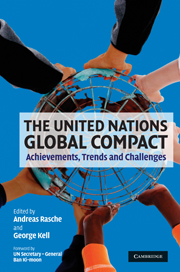Book contents
- Frontmatter
- Contents
- List of figures
- List of tables
- List of boxes
- List of abbreviations
- List of contributors
- Acknowledgements
- Foreword
- Why This Book Matters!
- The Ten Principles of the United Nations Global Compact
- 1 Introduction: the United Nations Global Compact – retrospect and prospect
- Part I Achievements, trends and challenges: reflections on the Principles
- Part II Participants and engagement mechanisms
- Part III Governance and Communication on Progress
- 14 The United Nations Global Compact's governance framework and integrity measures
- 15 The United Nations Global Compact Communication on Progress policy: origins, trends and challenges
- 16 COP reporting in action: the case of Petrobras
- 17 The United Nations Global Compact and the Global Reporting Initiative
- Part IV Local Networks: the emerging global–local link
- Glossary
- Bibliography
- Index
16 - COP reporting in action: the case of Petrobras
Published online by Cambridge University Press: 05 February 2012
- Frontmatter
- Contents
- List of figures
- List of tables
- List of boxes
- List of abbreviations
- List of contributors
- Acknowledgements
- Foreword
- Why This Book Matters!
- The Ten Principles of the United Nations Global Compact
- 1 Introduction: the United Nations Global Compact – retrospect and prospect
- Part I Achievements, trends and challenges: reflections on the Principles
- Part II Participants and engagement mechanisms
- Part III Governance and Communication on Progress
- 14 The United Nations Global Compact's governance framework and integrity measures
- 15 The United Nations Global Compact Communication on Progress policy: origins, trends and challenges
- 16 COP reporting in action: the case of Petrobras
- 17 The United Nations Global Compact and the Global Reporting Initiative
- Part IV Local Networks: the emerging global–local link
- Glossary
- Bibliography
- Index
Summary
Introduction
This chapter provides a practitioner's perspective on how Petrobras builds and manages its Communication on Progress (COP) reporting. It is not possible to write about the COP experience of Petrobras without telling the story of the progress of the company regarding social and environmental corporate responsibility during recent years. Petrobras is an integrated oil and gas company, the largest corporation in Brazil, and one of the major companies in the international oil sector. As such, Petrobras acknowledges its prime responsibility for the environment where it operates and striving for sustainable development is a historical commitment of the company. Recently, these efforts have shown important improvements being integrated in its corporate governance.
In 2007, Social Responsibility became a corporate function at Petrobras. Therefore, in the ‘2020 Petrobras Strategic Plan’ the mission of the company is to ‘[o]perate in a safe and profitable manner in Brazil and abroad, with social and environmental responsibility, providing products and services that meet client needs and that contribute to the development of Brazil and of the countries where we operate’. The company vision for 2020 is ‘We will be one of the five largest integrated energy companies in the world and the preferred choice among our stakeholders’. Two characteristics of this vision are that Petrobras' operations should be a benchmark in social and environmental responsibility and committed to sustainable development. For this management challenge, a strategic goal for 2020 was also set: ‘To be a world class reference for social responsibility, contributing to the development of sustainable business models.’
- Type
- Chapter
- Information
- The United Nations Global CompactAchievements, Trends and Challenges, pp. 281 - 292Publisher: Cambridge University PressPrint publication year: 2010

